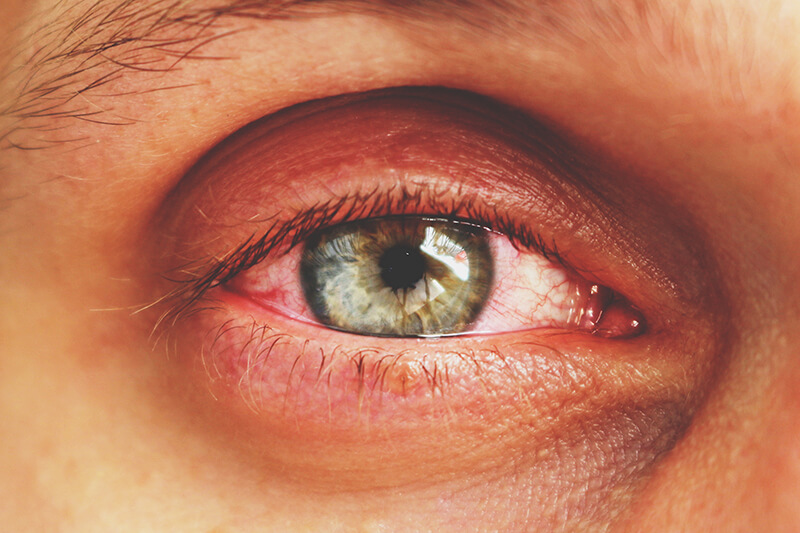- 29-May-23
An inflammation of the conjunctiva, the delicate transparent tissue that covers the white of the eye and lines the inside of the eyelids is known as conjunctivitis. A common nickname for it is "pink eye" because of the frequent reddening of the eyes. Conjunctivitis can be caused by various factors including viral or bacterial infections, allergies, irritants, or underlying medical conditions. The condition is highly contagious and can spread from person to person through direct contact, contaminated objects, or respiratory droplets. Conjunctivitis can cause symptoms such as redness, itching, excessive tearing, discharge, swollen eyelids, and sensitivity to light.
What is Pink Eye?
Conjunctivitis is an inflammation of the conjunctiva, a thin tissue that lines the inside of the eyelids and covers the white part of the eye. Pink eye is another name for conjunctivitis. It is called pink eye because the condition commonly causes the eyes to appear pink or reddish in color. Pink eye can be caused by a variety of conditions, including bacterial or viral infections, allergies, irritants, or underlying medical conditions.
Conjunctivitis Meaning in Urdu:
جب آپ کی آنکھیں سرخ یا گلابی ہو جاتی ہیں، تو اس کا مطلب ہے کہ وہ حصہ جو عام طور پر سفید ہوتا ہے اب خون کی چھوٹی چھوٹی نالیوں کو دکھا رہا ہے جو سوجن ہیں۔ یہ اس وقت ہو سکتا ہے جب آپ جراثیم سے بیمار ہو جائیں یا اگر آپ کو الرجی ہو۔ یہ جاننا ضروری ہے کہ اگر آپ کی آنکھیں سرخ ہیں، تو یہ متعدی ہوسکتی ہے، لہذا آپ کو محتاط رہنا چاہیے کہ اسے دوسروں تک نہ پھیلائیں۔
Types of Conjunctivitis:
There are several types of conjunctivitis each with its own causes and characteristics. The main types of conjunctivitis include:
- Viral Conjunctivitis: This kind is brought on by a viral infection which is frequently connected to respiratory illnesses or the common cold. It usually starts in one eye and spreads to the other since it is very contagious. Within a week or two, viral conjunctivitis typically goes away on its own.
- Bacterial Conjunctivitis: Bacterial conjunctivitis is typically brought on by bacterial infection which is frequently brought on by microorganisms like Staphylococcus aureus or Streptococcus pneumonia. It has a tendency to produce a sticky discharge, especially after sleeping, and may need to be treated with antibiotic eye drops or ointment.
- Allergic Conjunctivitis: Allergic conjunctivitis occurs due to an allergic reaction to substances like pollen, dust mites, pet dander, or certain medications. It usually affects both eyes and is associated with itching, redness, and watery discharge. Avoiding the allergen, using antihistamine eye drops, and managing allergy symptoms are typical approaches to treat this type.
- Chemical Conjunctivitis: Exposure to irritants like smoke, chemicals, or foreign objects can cause chemical conjunctivitis. It leads to redness, a burning sensation, and watery discharge. Flushing the eyes with clean water and removing the irritant is crucial for relief.
- Giant Papillary Conjunctivitis (GPC): GPC is a type of conjunctivitis that primarily affects contact lens wearers. It is characterized by the formation of large bumps on the inner surface of the eyelids leading to redness, itching, and discomfort. Treatment involves discontinuing contact lens use using medicated eye drops and ensuring proper lens hygiene.
It's important to note that these types of conjunctivitis can have overlapping symptoms and a proper diagnosis by a healthcare professional is necessary to determine the specific type and appropriate treatment.
Conjunctivitis Symptoms:
The symptoms of conjunctivitis regardless of the underlying cause can include:
- Redness: The white part of the eye or inner eyelids may appear pink or red.
- Itching: The eyes may feel itchy and irritated, leading to a strong urge to rub them.
- Watery eyes: Excessive tearing or watery discharge from the eyes is common.
- Discharge: The eyes may produce a sticky or crusty discharge, especially after sleep. The color of the discharge can vary depending on the cause such as clear, white, yellow or green.
- Swelling: The eyelids could swell or puff up.
- Sensitivity to light: The eyes may be more sensitive to bright light (photophobia).
- Blurred vision: In some cases, conjunctivitis can cause temporary blurry vision.
It's vital to keep in mind that these symptoms can change based on the person and the type of conjunctivitis. It is best to speak with a healthcare provider if you are having these symptoms in order to receive a precise diagnosis and the best course of action.
When to see a Doctor?
Eye redness can be brought on by a number of dangerous eye disorders. Eye pain, the sensation that something is stuck in your eye, impaired vision, and light sensitivity may be brought on by these disorders. Seek urgent care if you develop these symptoms. Contact lens wearers must cease wearing their lenses as soon as pink eye symptoms appear. Make an appointment with your eye doctor to ensure you don't have a more serious eye infection related to contact lens use if your symptoms don't start to improve within 12 to 24 hours.
Eye Specialist Lahore:
Integrated Medical Care Hospital (IMC Hospital) is one of the most prestigious institutions in Pakistan which is known for its performance and outstanding results regarding Ophthalmology (Eye Surgery). Ophthalmology Department at Integrated Medical Care Hospital provides clinical eye care under the leadership of one of the most, senior and competent ophthalmologists in the country.
Here you find one of the best Ophthalmology (Eye Surgery) Specialists in Lahore Pakistan. Visit today and book your appointment at Integrated Medical Care Hospital (IMC Hospital).
Dr. Tayyab Eye Specialist in Lahore:
IMC Ophthalmology Department is led by Prof. Dr. Muhammad Tayyab, who is among the most esteemed ophthalmologists in the country. His decades of experience in Ophthalmological practice coupled with his extensive training in the UK makes him a capable and clinically remarkable leader for our team. His team is fully equipped with cutting-edge surgical equipment to provide treatment and care for all kinds of ocular problems. IMC provides the full spectrum of Ophthalmology services, from diagnosis to treatment.

 Map
Map










